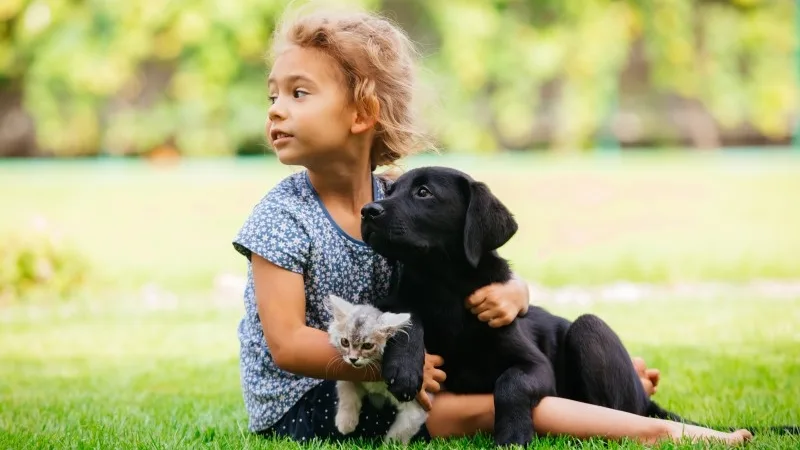Is Having a Pet with Young Children a Good Idea?
Did you know that having pets can benefit your child both emotionally and mentally? Here are 7 mental, physical, and emotional benefits of owning a pet for children.

It's no secret that having a pet as a child creates memories that last a lifetime. Everyone remembers their first pet, how much they loved them, and how much fun they had with them.
Having a pet is more than just fun for a child, however. It can benefit their emotional, mental, and physical health in many ways. Read on to learn the 7 benefits of pets for young children.
1. Pets Help Children Develop Social Skills
Having a pet is like having a companion to talk to, laugh with, and learn from. Research has shown that building relationships with pets helps children to translate those relationship skills to other people as well.
By interacting with their pet, young children develop empathy, learn better stress management, and build their confidence. Other research studies have even shown that having a pet – specifically a dog – can help bring kids out of their shells and build their self-esteem.
2. Pets Provide Comfort for Children
One thing that pets are great at, for children and adults alike, is offering comfort and companionship. Pets have a way of being there for you through the tough moments in life. And for children, this comfort is especially important.
Pets provide a non-judgmental space for children to talk through and process their emotions. Studies have shown that having a pet as a young child can increase emotional expression and control in children, as well as lower their overall stress levels.
3. Pets Encourage Healthy Habits
Dogs need daily exercise, and for young children with dogs at home, this means lots of time spent outside playing or going for family walks. This daily exercise routine helps establish healthy habits in children from a young age.
Young children with a pet at home, especially a dog, get more physical activity, less screen time, and may even enjoy more sleep than those without a dog, according to a recent HABRI study.
Researchers found that preschool-aged children (2-5 years old) did 8 more sessions of physical activity per week than those without a dog. Those same children who played with their dog 3 or more times per week enjoyed less screen time, more outdoor play, and had, on average, 16 more minutes of sleep every night.
4. Pets Can Decrease Allergies in Young Children
One major concern of many parents before getting a pet is all the germs the pet can introduce to their child. Pets can be dirty, and when it comes to dogs, they tend to have no discrimination when it comes to who or what they lick.
The good news for parents is that having a pet can actually decrease your child's chances of getting sick when they're older. Children who live in a pet-friendly household as babies are less likely to develop allergies to animals as adults – with cats, their chances can decrease by 50%.
It doesn't stop with allergies. Early exposure to pet allergens and pet-related bacteria can strengthen a child's immune system, making them less likely to get sick. This includes a lower risk of coughs and common colds, as well as a lower risk of childhood asthma.
5. Pets Help Children Learn
Pets are exciting for children, and they often make any associated activities more fun and exciting in the process, including learning. Having a pet present can help children develop their reading skills, as well as improve their attention and ability to focus on a task.
Studies have shownthat when a pet is placed in a classroom, children are more likely to focus on a task and follow instructions. They're also more willing to engage with their teacher and the assignment and exhibit more positive behaviors overall.
Pets can also help children who are struggling readers improve by being willing ears for their reading practice. Pets make reading more fun, and they give your child a stronger purpose for reading than simple improvement goals can.
Young children have fun reading books to their pets, all while gaining confidence and improving their fluency. It's a win-win for everyone involved!
6. Pets Teach Responsibility
One of the most obvious benefits of having a pet in the home is to teach children responsibility and what it means to care for another living being. Pets require daily maintenance, from food to exercise and grooming.
While young children shouldn't be fully responsible for the care of a pet, involving them in the process instills a sense of responsibility and work ethic from a young age.
7. Pets Provide Excellent Teaching Moments
Beyond responsibility, having a pet in the house offers many valuable teaching moments. Pets are unpredictable, so they serve as a great talking point for many of life's greatest lessons.
Pets can be used to teach children respect and empathy for other living things and to better understand our connection to nature. They can help teach lessons about birth, illness, and death in a way that's easier for a child to understand. They also help teach children love, loyalty, affection, and the importance of family.
Important Tips for Having a Pet with Young Children
While there are many benefits to having a pet, it's important to be prepared for the challenges that can come with it as well. Here are three tips for making sure your pet and your children are happy and healthy together:
Always Supervise Your Child with Your Pet
Young children should never be left alone with the family pet, no matter how much you trust both of them. Children and pets can be unpredictable, and you never know when an accident could happen.
It's best to supervise any interactions, so you can use them as teaching moments.
Teach Your Child to Treat Your Pet with Kindness
When children are young, they have little experience with pets and the appropriate ways to touch them. Children may pull on a pet's fur, or play too rough, leading to an uncomfortable experience for the pet – and a potentially dangerous situation.
Always teach children the appropriate ways to show pets affection. Teach them to be gentle and calm and encourage these behaviors from a young age.
Choose a Pet that Fits Your Family's Lifestyle
Choosing the right pet for your family is a big choice, and there are many factors to consider.
How much time do you realistically have to dedicate to caring for your pet? What does your family budget look like? Are you a high-energy, active family that's always on the go, or do you prefer to spend quiet evenings playing at home?
All of these factors are important to consider so you can find the right pet that fits your family's needs.
Is Your Child Ready for a Pet?
You know your child best, and deciding whether it's time to get a pet is ultimately a decision you make as a family. If you decide to add a new furry friend to your home, you can feel confident that you're not only creating many, lifelong memories for your child, but you're helping their overall health and well-being as well.
Enrolling your pet in a pet insurance policy when they’re young is another great way to prepare for a happy and healthy future. Wellness Coverage from AKC Pet Insurance (underwritten by Independence American Insurance Company) reimburses for a variety of routine and preventive care expenses, allowing you to focus more on the health of your pet and less on costly veterinary bills. Click here to get a quote today!

Richard has shared his life with pets since childhood, and currently has a rescue cat and dog. He works with veterinarians and pet businesses to improve their content. To find out more, please visit his [website](https://richardrowlands.com/).
READ MORE ARTICLES

